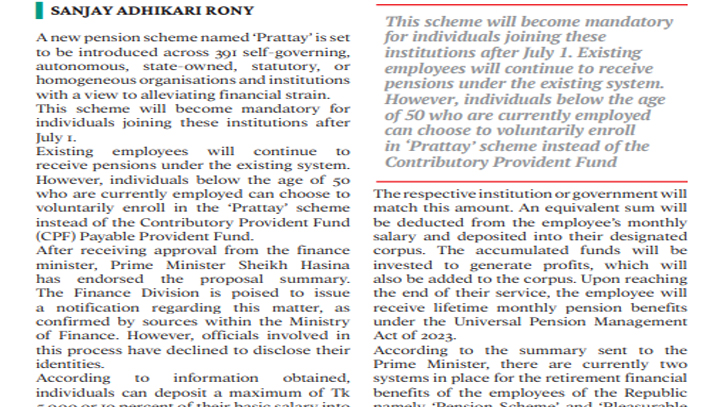
Photo : Messenger
A new pension scheme named 'Prattay' is set to be introduced across 391 self-governing, autonomous, state-owned, statutory, or homogeneous organisations and institutions with a view to alleviating financial strain.
This scheme will become mandatory for individuals joining these institutions after July 1.
Existing employees will continue to receive pensions under the existing system. However, individuals below the age of 50 who are currently employed can choose to voluntarily enroll in the 'Prattay' scheme instead of the Contributory Provident Fund (CPF) Payable Provident Fund.
After receiving approval from the finance minister, Prime Minister Sheikh Hasina has endorsed the proposal summary. The Finance Division is poised to issue a notification regarding this matter, as confirmed by sources within the Ministry of Finance. However, officials involved in this process have declined to disclose their identities.
According to information obtained, individuals can deposit a maximum of Tk 5,000 or 10 percent of their basic salary into this scheme each month, whichever is lower. The respective institution or government will match this amount. An equivalent sum will be deducted from the employee's monthly salary and deposited into their designated corpus. The accumulated funds will be invested to generate profits, which will also be added to the corpus. Upon reaching the end of their service, the employee will receive lifetime monthly pension benefits under the Universal Pension Management Act of 2023.
According to the summary sent to the Prime Minister, there are currently two systems in place for the retirement financial benefits of the employees of the Republic namely ‘Pension Scheme’ and ‘Pleasurable (Anutoshik) Scheme’. In both cases the employee does not have to pay any contribution for availing retirement benefits. Recently, public pension scheme has been launched in the country for private institutions.
Employees of government institutions (Ministry or Division, Directorate and its Subordinate Offices) are generally covered under the ‘Pension Scheme’. They get monthly pension benefits, medical allowance, festival and New Year allowance along with one-time gratuity as retirement benefits at the end of service.
On the other hand, employees of various autonomous institutions (autonomous, statutory, state-owned, institutes, corporations, public universities, authorities, boards, commissions, academies, etc.) established by law and managed by a governing body or board of directors are generally included in the welfare scheme. They get a one-time gratuity as a retirement benefit at the end of their service life.
Employees of autonomous organizations are expressing a strong interest in joining the pension scheme due to the substantial disparity in retirement financial benefits between the two schemes. They are actively lobbying the finance department to extend pension schemes similar to those offered to government employees. Several organizations have obtained approval from the Finance Division to initiate pension schemes for their employees using their own funds.
However, facing challenges in sustaining these schemes independently, they are now seeking financial support from the Finance Division. This situation is leading to embarrassment and frustration among the organisations involved.
The Prime Minister was also informed that 35 of the existing 391 autonomous or state-owned institutions in the country have launched the scheme with the approval of the Finance Division on the condition of operating the pension scheme on their own income. Among them, 19 pension schemes are in operation. The remaining 16 institutions depend on government assistance.
Apart from this, 66 self-governing or autonomous, statutory, state-owned institutions, including 52 public universities, have requested the Finance Division to provide budget allocation. As a result, out of 391 autonomous or state-owned institutions, the remaining 290 are currently running Pleasurable (Anutoshik) Scheme. There is pressure on the Finance Division to introduce pension schemes in these institutions as well.
According to the Finance Division’s proposal, the government’s expenditure on pension and retirement benefits increased by more than 10 percent on an average in the last five fiscal years. Referring to this matter, the proposal states that a total of Tk 34,176.49 crore has been allocated to the ‘Pension and Retirement Benefits’ sector in the budget of the financial year 2023-24. It is 0.67 percent of the current GDP, 4.42 percent of the total budget and 7.10 percent of the operating budget.
In such a situation, if a pension scheme like that of government employees is introduced for the employees of the 290 institutions where the Anutoshik scheme is in operation, the financial burden of the government will increase. This will put additional pressure on the budget and may hamper the country’s incremental development activities. In this situation, the government has decided to introduce the ‘Prattay’ scheme.
It should be noted that in the election manifesto of Awami League in 2008, there was a promise to ensure their old age protection by bringing the elderly population under a sustainable and well-organised social security structure. For this reason, Universal Pension Management Act-2023 was formulated. Four pension schemes were launched on August 17 last year. The schemes are ‘Prabas’ for expatriate Bangladeshis; ‘Progati’ for private sector employees; ‘Surakkha’ for self-employed citizens like rickshaw pullers, farmers, labourers, blacksmiths, fishermen and weavers and ‘Samata’ for low-income people.
Messenger/Fameema








